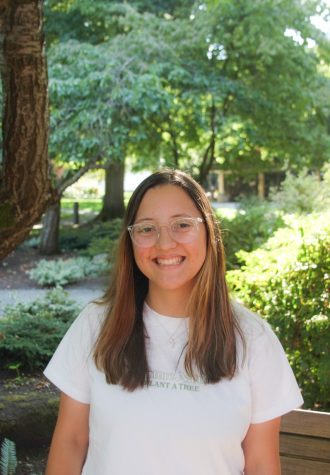Fires spark conversation on campus
Students reveal different perspectives on west coast fires
September 18, 2020
As thick smoke settles over the city of Seattle, fires continue to destroy homes and air quality worsens along the west coast.
With varying backgrounds and knowledge, the shock and effect of the fires have proven to influence students at Seattle Pacific University in different ways.
For senior Bea Bouman, fires are not something they grew up around.

“I am originally from Michigan and have no experience around fires. It shocks me how little people are talking about the smoke/fires beyond social media. It seems very normalized here and I’ve seen a lot of people hanging out outdoors, which has been surprising,” Bouman said over email.
The shock of the fires came with concerns for our environment and those without a home.
“The smoke makes me nervous and is yet another reminder of the serious implications of climate change. While some fires can be healthy for an environment it seems clear that the damage and scale have grown in recent years,” Bouman said. “I worry about the population along the west coast experiencing homelessness currently who may have no safe place to be currently.”
As concerns about the fires continue to grow, so does the number of students and families being affected.
Junior elementary education major Alyssa Buller was forced to evacuate her home in Santa Cruz, California just weeks before moving back up to campus.
“Being evacuated was, in a word, terrifying. It was scary not knowing where we were going to live or if we would ever be able to go back to our house,” Buller said. “I actually had to leave my family while we were evacuated to drive up to Seattle to begin RA training – I was worried the entire time.”
Buller’s home was not burned down, but she feels empathy towards her friends in the surrounding areas who were not as lucky.
“Many of my friends lost their homes and livelihoods, so I’m able to count my blessings and know that we will rebuild!” Buller said.
Some students, like sophomore business administration major Justin Freeman, stand in prayer with those being affected by the fires.
“The fires are tragic, and I can’t even imagine what the impacted families are going through. I’ve been following the news closely, and the situation is unreal. My thoughts and prayers go out to all who have been affected,” Freeman said.
As a transfer student, Freeman moved in on the 10th of September just as the smoke was beginning to settle over the city.

“The air quality has been rough since I moved in and I’m really hoping that it all clears up soon,” Freeman said.
Quality of the air is causing several problems for people who reside in the Seattle area as well as people up and down the coast, but SPU junior nursing major Helena Balbirona sheds a light on the effects of the smoke in the midst of a pandemic.
“This smoke is deadly enough on its own. I’ve heard many comparisons to when Mt. St. Helens erupted. But this is happening during a global pandemic that targets the respiratory system,” Balbirona said. “Yet another factor to consider when assessing the risk of leaving one’s home these days.”
As someone who is on a track to be in the medical field, Balbirona contributes a unique perspective that adds to the complexities of the air quality brought about by the fires.
“Another disaster that places more people requiring medical attention from our healthcare professionals who are already exhausted by the pandemic,” Balbirona said.
While reflecting on the significance of the current west coast fires, important questions came to mind.
These questions are ones that Balbirona believes have not been answered, but need to be addressed. In the middle of tragedies such as this, SPU students believe it is important to consider all factors involved, not just the most obvious ones.
“Are we doing enough for those who are fighting these fires or are actively pursuing sustainable climate health? Are we recognizing that Mexico is sending firefighters to help combat the U.S. West coast fires?” Balbirona asked.
“Are we making sure our representatives hear that our voices are in support of a Green New Deal? Are we giving Indigenous people autonomy of caring for the land?”


























































































